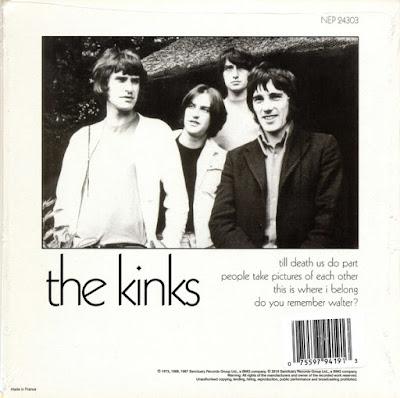I have been exposed to Electonic music for my entire life. It was about two years ago that I started to seriously purchase 'electronic' works from the 1950s and 1960s on vinyl. On my journey of record buying and music listening, I discovered a name, Vladimir Ussachevsky who consistently turns up incredible music. Along with Milton Babbitt and George Balch Wilson, all three were judges in a contest devoted to electronic music. This album "Electronic Music IV" is the results of that competition. Five winners.
The winner is Olly W. Wilson, a composer I know nothing about, except that he's African American, and known for establishing the TIMARA (Technology in Music and Related Arts) at Oberlin Conservatory, the first program devoted to electronic arts. His winning piece "Cetus" (1967) opens the album, and it's a beauty. Pure electric sine wave which slowly evolves into something dramatic.
William Hellermann's "Ariel (1967) is a work that is a live performance, not a composition. The source of the sound was a gong, and after that, it is anyone's guess. This piece was realized in the Columbia-Princeton Electronic Music Center, which is where the great Ussachevsky made his recordings. To me, this is the Sun Records of Electronic Music.
"Dixi" (1967) composed by Eugeniusz Rudnik is a highly textural work in electronics. Recorded in Poland, it's an intense listening experience. The tone changes and I found the music to be very visual. Not all music is visual to me, in fact, this album is mostly an aural experience - but this particular cut has an additional flavor to it. Outside of Poland, he seems to be an obscure music figure. He just passed away last year. For sure, I'm going to hunt for his music.
Pril Smiley, a great name, and the only female composer/performer here on this album have a composition "Eclipse" (1967) that is also recorded at Sun Records, I mean at Columbia-Princeton Electronic Music Center. 85% is electronic sounds, but she added pre-recorded percussion to the mix as well. Moody and very efficient work.
Bohdan Mazurek, another Polish composer, has "Bozzetti" (1967) is another artist here where I want to check his other works. This music is four pieces, and of them has a violin that is almost shocking to hear in the context of electronic music. I like the mixture of real instruments and electronic effects. One of the reasons why I really love Ussachesky is his ability to use instruments with the dials and switches. The tension between wooden or metal instruments with the electric is a fabulous cocktail to me. "Bozzetti" is mostly if not all electric, except for that violin and I think voices.
Jozef Malovec from Czechoslovakia ends the album with his "Orthogenesis" (1966-1967) is pure hardcore electronic and the tape machine. The purity of the two is another version of a classic cocktail. A splendid album. A good one for my collection.
















